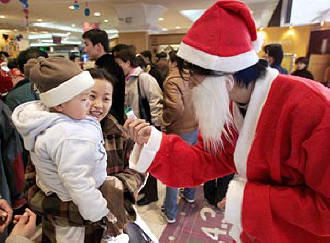Christmas in China
Ho, Ho, Hao
The Economist
Dec 18th 2003
Cash registers ring out

|
Christmas in China The Economist Dec 18th 2003
Cash registers ring out |
|
VISITORS to the Beijing Aquarium earlier this month might have been surprised at the sight of two divers both dressed as Father Christmas planting a large plastic tree at the bottom of a tank full of sea creatures. The aquarium is under the control of the city government. China officially espouses atheism and is deeply suspicious of religion. But in the interests of encouraging consumer spending, the government is happy to abet a Christmas craze that is sweeping big Chinese cities.
Officials can relax in the knowledge that Christmas in China has even less to do with celebrating the birth of Jesus than it does in countries supposedly steeped in Christian culture. The government says that only about 1% of the population is Christian. Even the most generous unofficial estimates put the figure at only around 10%. Yet in the space of 15 years or so, Christmas's visible impact on China's main cities has changed from being almost negligible to as in-your-face as it is in the West. Shop windows and office buildings are festooned with Christmas decorations, fairy lights and Christmas trees.
A Beijing government survey two years ago found that 30% of the capital's residents planned to celebrate Christmas. Of these more than half said they did not know the religious origins of the festival and less than 3% said they wanted to mark Christmas for religious reasons. For the rest it was a pretext to exchange gifts and party with friends.
Surveys suggest that celebrating Christmas is most popular among young, affluent white-collar workers. Such people see Christmas as a way of enjoying themselves without the pressures of the big family get-togethers of the lunar new year festival, China's most important holiday (which falls on January 22nd next year). In effect it is a more hedonistic, bigger-spending version of Valentine's Day, another increasingly popular import.
The aquarium is among many venues in Beijing offering Christmas Eve dinner and entertainment for the well heeled (few will celebrate on the day itself because it is a working day). Tickets range from $48 to $140, equivalent to about six months' worth of spending on food for the average urban resident. For this, revellers can enjoy a buffet with a mix of roast turkey and Chinese dishes, more underwater Father Christmases and a “dance-with-sharks” stunt by divers, prudently unencumbered by red robes.